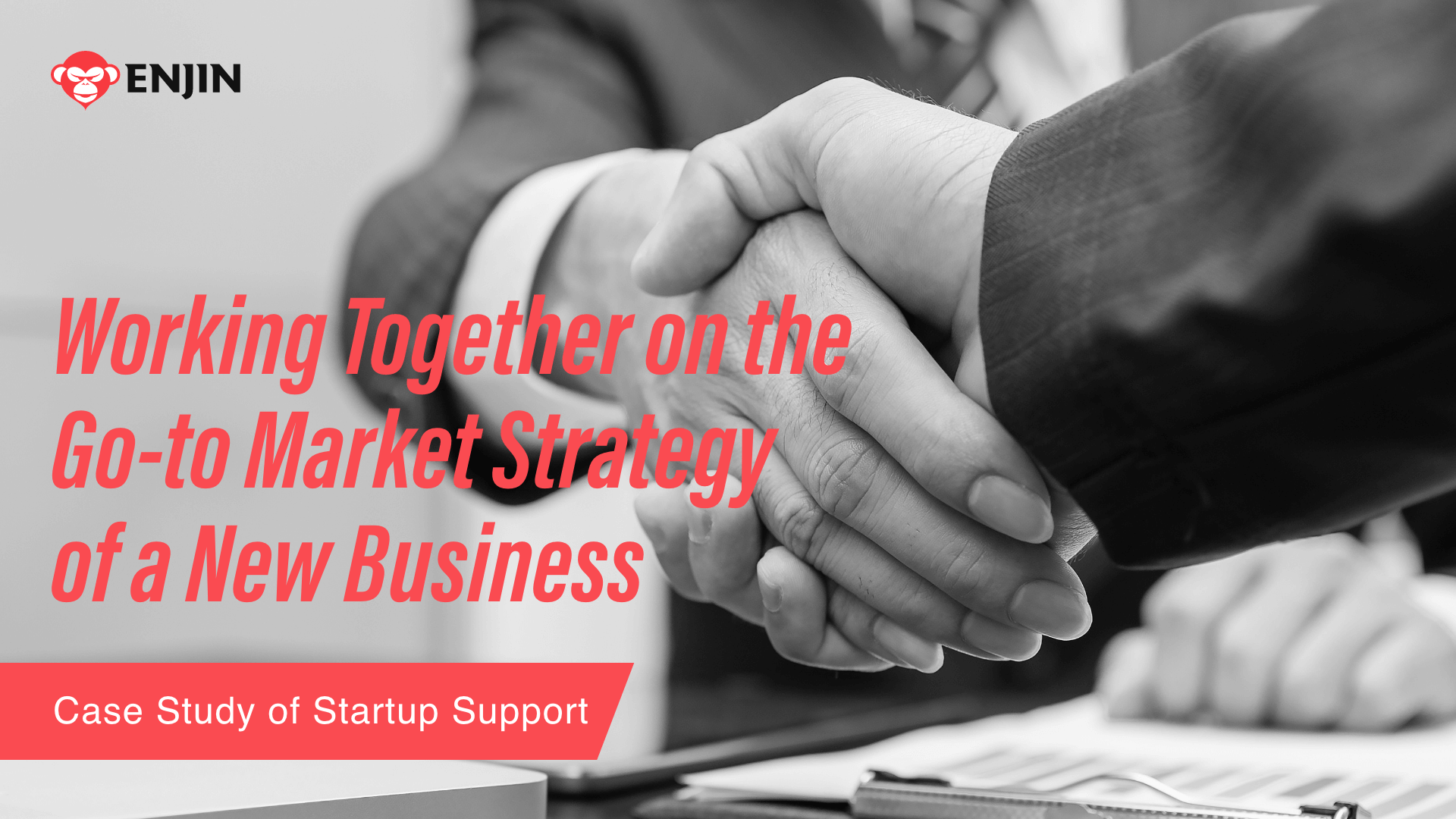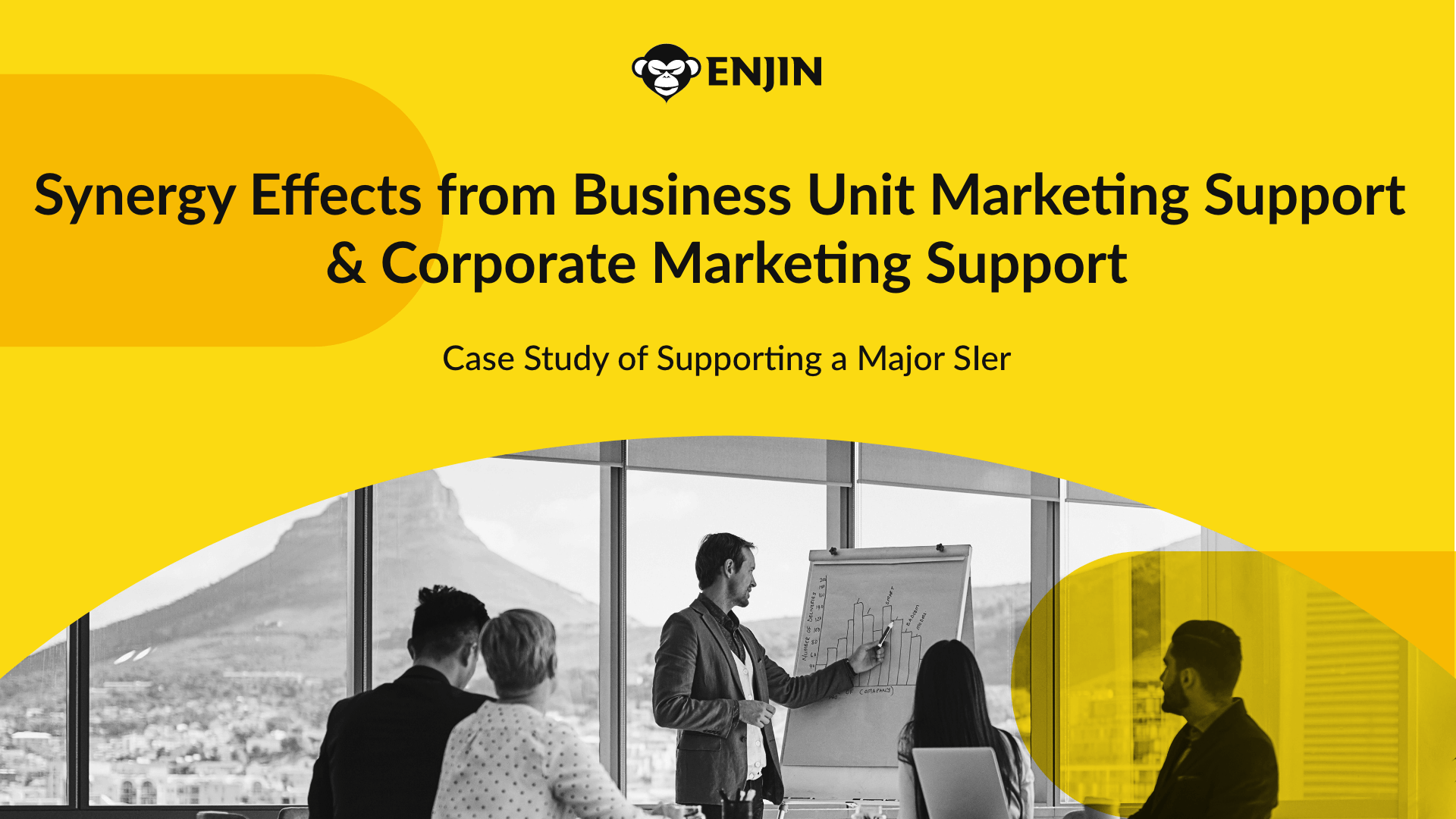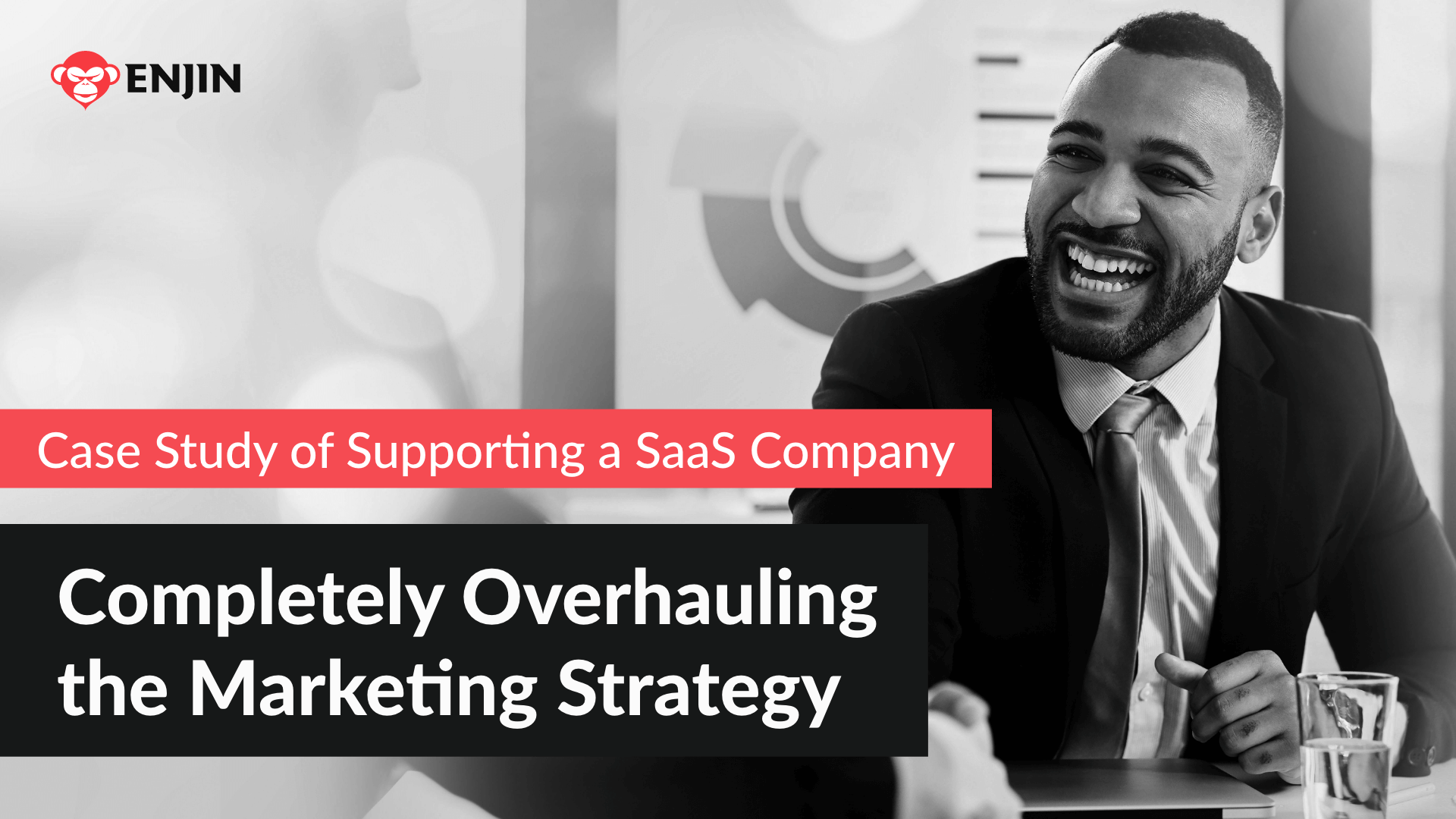Insights from Enjin, the Experts Behind 600+ Events a YearWhat Makes Events Work in Japan?
How to Win with Content & Promotion
By MarkeZine Editorial Team
Photography by Toru Takayama / Written by Mikako Tsutsumi
- November 27th, 2024 -
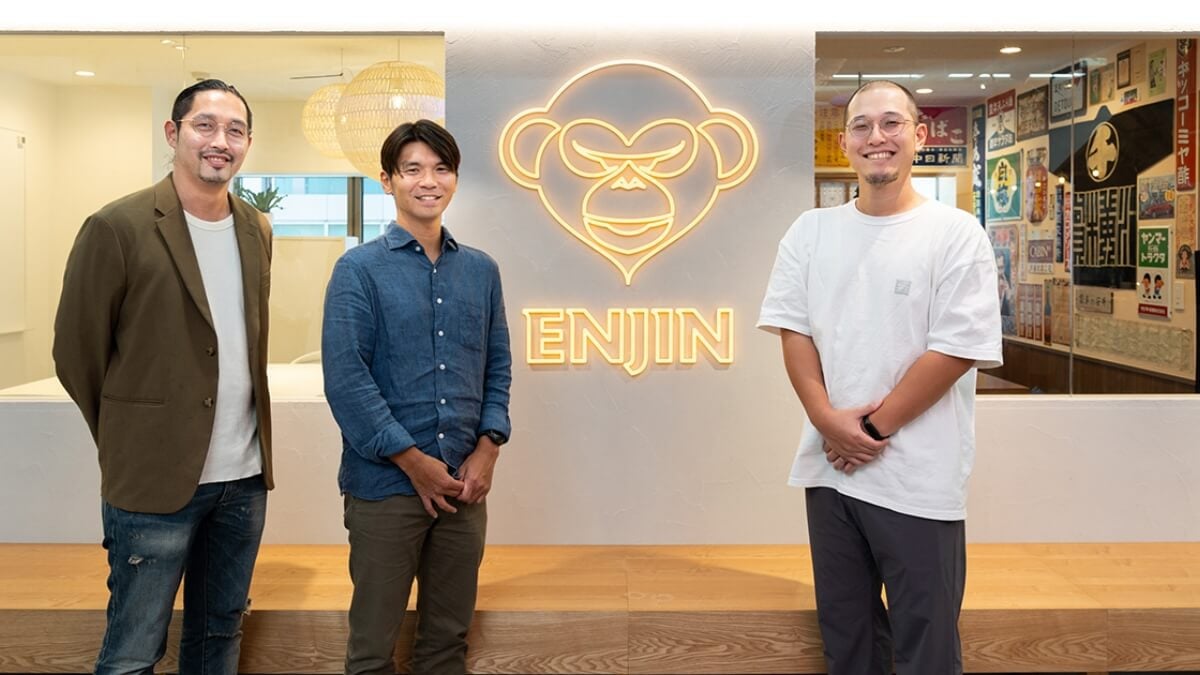
For global and local marketers alike, Japan is one of the most unique—and difficult—markets for B2B event success. Audience expectations are high, content must deliver immediate value, and cultural nuances shape how people engage.
In this article, we talk to Ryusuke Tsuchiya and Shingo Akutsu of Enjin, a Japan-based firm that supports over 600 B2B events annually. Together with Tsubasa Michigami, editor of Japan’s leading marketing publication MarkeZine, they unpack what really makes events resonate in the Japanese market.
Backed by a survey of 300 IT professionals in Japan, this article dives into two of the biggest pain points marketers face: content planning and audience acquisition. Whether you're planning a seminar, a virtual event, or a trade show, this piece will give you actionable insight to drive real results in Japan.
▼Contents
"The Fundamental Issues" at the Planning Stage
Michigami: I manage various aspects of the MarkeZine Day event, from content planning to operations. Could you share Enjin’s experience and scope of support for event marketing?
Akutsu: At Enjin, we primarily serve clients in the IT sector, offering consulting, event marketing, and digital marketing as part of our broader B2B marketing support. In terms of events, we handle everything from small-scale seminars to large flagship conferences, tailored to client needs—including exhibitions.
Our support spans the entire process: planning, attracting attendees, pre- and post-event strategies, lead management, and branding. We don’t limit ourselves to traditional event production boundaries.
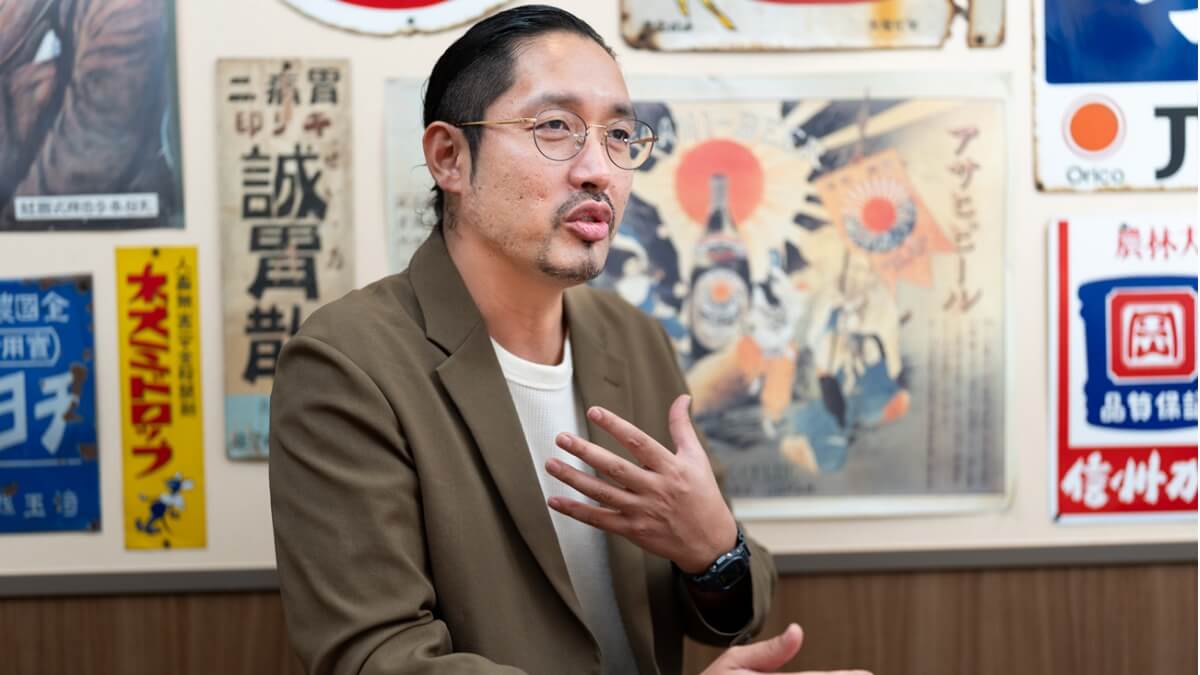
Shingo Akutsu, Executive Officer | Senior Manager | Senior Director, Enjin LTD
Michigami: In this interview, we’ll not only draw from Enjin’s expertise but also explore insights from your recent survey of 300 IT professionals. Could you first summarize the survey?
Tsuchiya: Information gathering online has become standard behavior among users, and digital tools for B2B marketing continue to evolve. Since the pandemic, hybrid models blending online and offline have become the norm.
At the same time, there's been a strong resurgence in demand for in-person events—larger in scale and more frequent.
Marketers now face a dilemma: should they prioritize digital channels or in-person tactics like events? Compounding this is the reality that many marketers still plan events based on intuition rather than data. They feel pressured to deliver results but often lack the confidence or foundation to build effective event strategies. That’s why we launched the survey—to provide actionable insights that marketers can rely on when planning events.
Akutsu: We surveyed people in roles such as IT systems managers, R&D engineers, and IT team leads—essentially those responsible for choosing IT tools. We asked about their preferred information sources, reasons for attending events, registration drivers, and expectations for in-person events.
Michigami: That’s incredibly helpful. We also struggle with uncertainty in planning events. What are some common concerns clients bring to Enjin?
Tsuchiya: Most inquiries fall into two categories: the first is a clear request to exhibit at or host an event; the second is vaguer—clients know the outcome they want but don’t know what steps to take.
Our survey showed that, after “industry media” (48.0%), the next most used sources for researching new IT tools were “vendor-hosted events” (23.1%) and “events hosted by media or agencies” (21.5%). Even in the digital age, there’s high demand for offline events where attendees can gather information face-to-face.
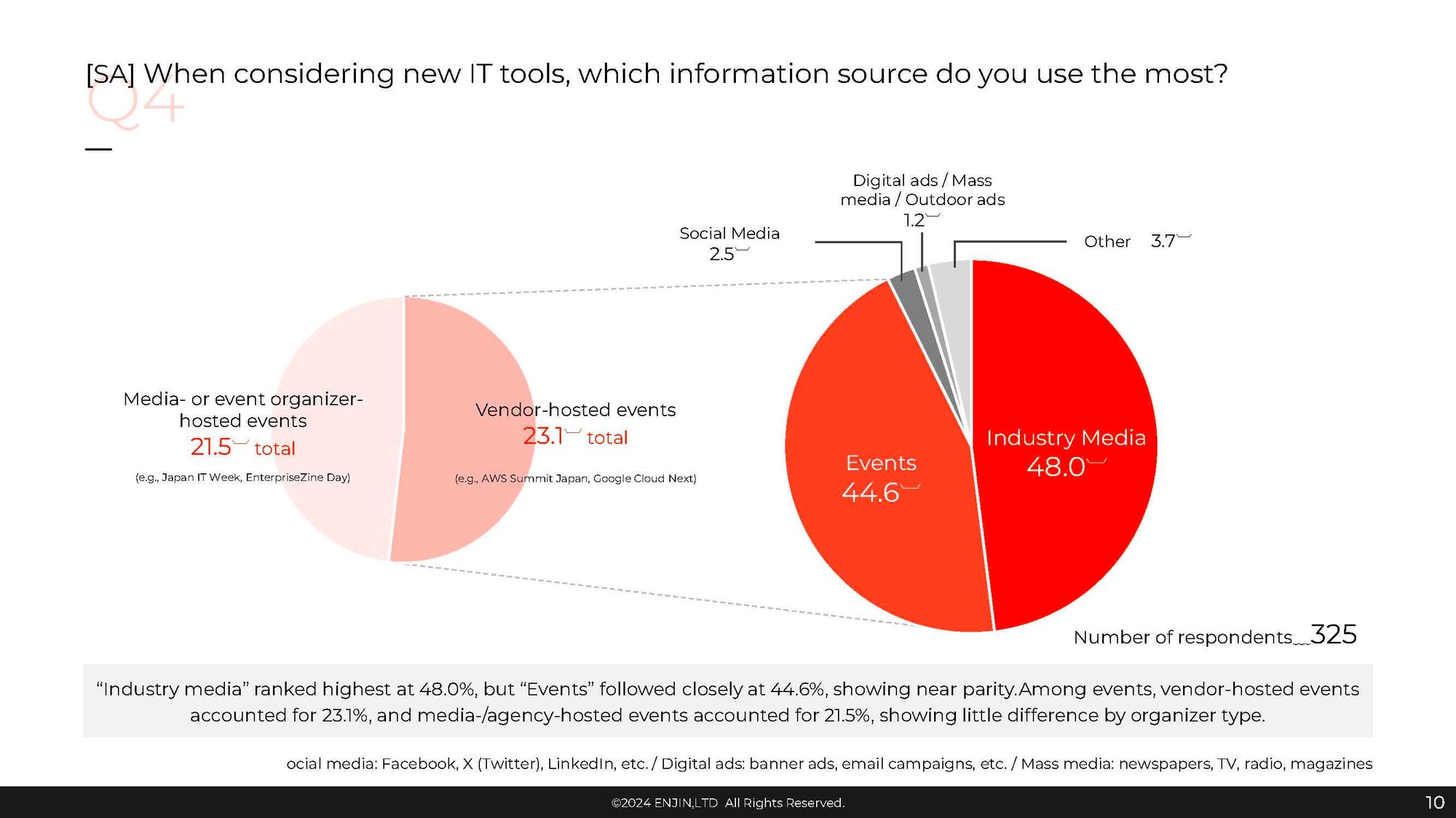
Primary Information Sources Used When Evaluating and Selecting New IT Tools
(From the Survey on Information Gathering for IT Tool Selection)
However, many event plans lack clarity around objectives, target audience, and scale. The event becomes a goal in itself. We help clients clarify these points and propose event plans aligned with their goals.
Akutsu: When the event date is already set, marketers often ask: “When is the best time to hold it?”, “Which venue should we use?”, “How should we attract attendees?”, or “What kind of content should we offer?”
Tsuchiya: For example, on the question of timing, our survey found that 55.6% of respondents said they had “no strong preference.” Meanwhile, 79.6% said “event theme” was the biggest reason they chose to attend. So rather than chasing competitor schedules, the ideal time is “when your theme and content will resonate most with your target audience”.
Are Celebrity Guest Speakers Effective?
Michigami: Content creation is a big challenge. Many industries host sessions featuring celebrities or athletes. Do you think these are effective?
Akutsu: Since the flood of online events during the pandemic, companies have increasingly wanted to invite celebrities to boost attendance. But just inviting famous people isn't always the best strategy. For example, if the event is on AI, we often suggest a professor who can discuss AI from an academic perspective—someone who fits the theme.
Tsuchiya: The survey revealed that the primary reason for attending large events is to “learn about the latest industry trends” (81.5%), and the top reason for registering is “event theme” (79.6%). Few people attend just because a celebrity is speaking—they care more about the content.
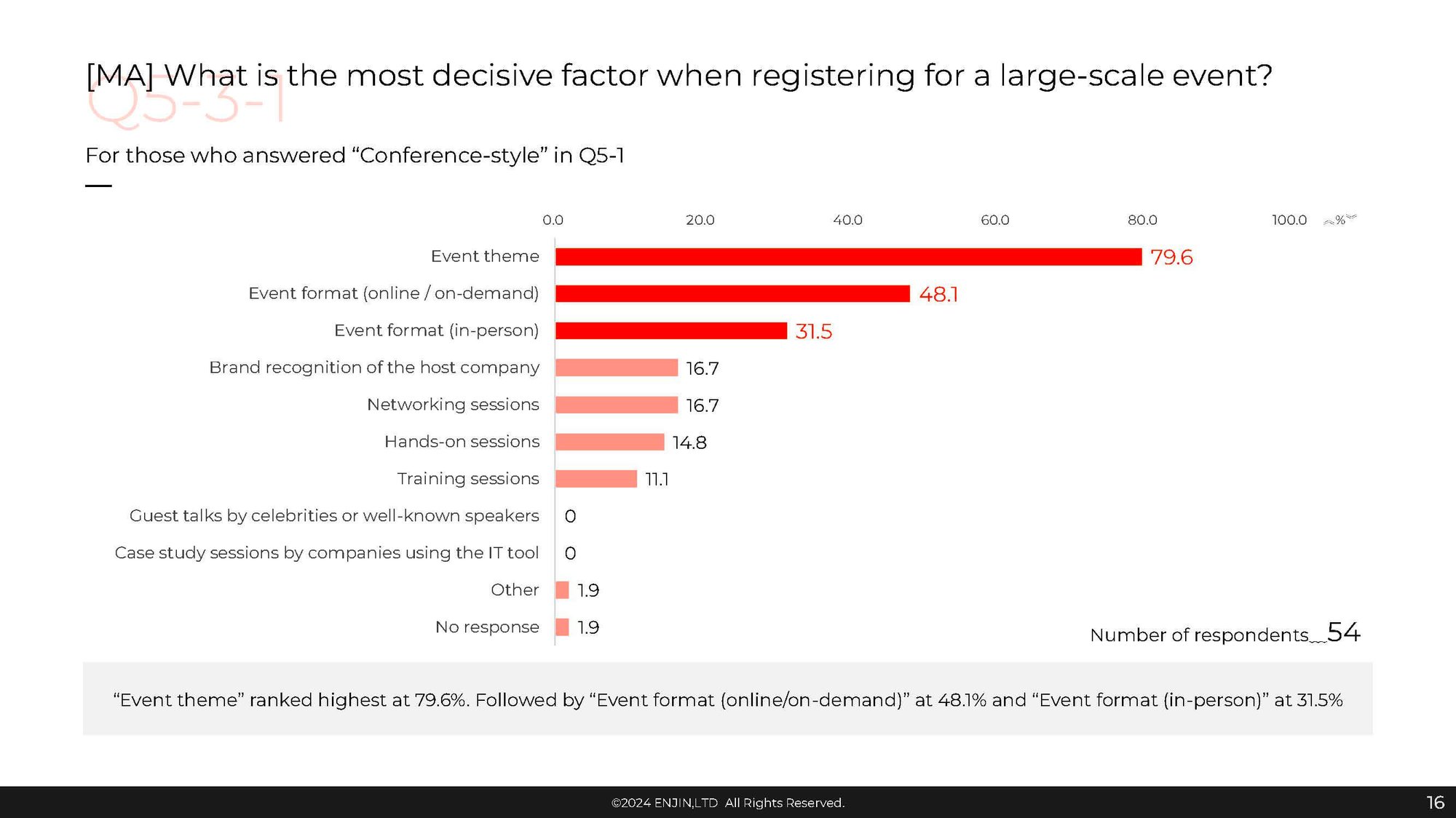
Top Reason for Registering for a Large-Scale Event
(From the Survey on Information Gathering for IT Tool Selection)
That said, when we asked which content attendees found most valuable after attending, “special lectures by experts or celebrities” (24.1%) ranked highest. So while it may not drive attendance, it clearly boosts satisfaction.
It’s important to distinguish between sessions that attract attendees and those that increase satisfaction.
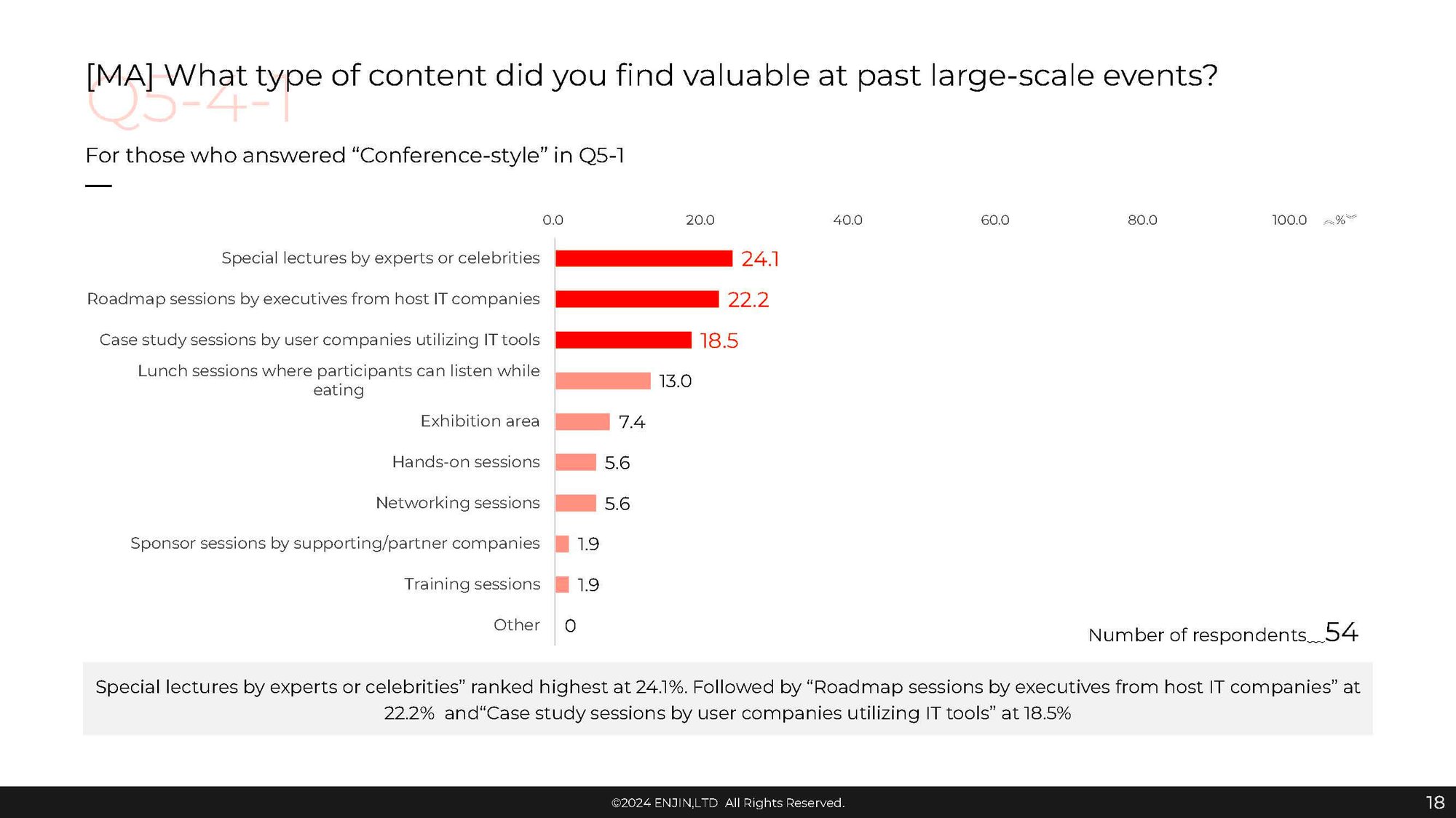
Most Valuable Content Experienced at Past Large-Scale Events
(From the Survey on Information Gathering for IT Tool Selection)
Document Download
You can review the survey results introduced in the article,
which were conducted with IT system managers, directly at your convenience.
We hope you find them useful when planning your next event.
How to Avoid the "I've Heard This Before" Syndrome
Michigami: Speakers often appear at multiple events, making it hard to avoid repetition. How do you keep your events unique?
Akutsu: When working with celebrities or experts, there’s often limited flexibility in their topics. It’s difficult to ask them to create a new presentation from scratch. So we usually provide the event theme, audience profile, and a proposed session title and abstract in advance. That helps ensure better alignment.
Tsuchiya: It’s also worth noting that high-profile speakers may not have time for a pre-briefing. That makes it all the more important to communicate ‘key information upfront”—who the audience is, what’s expected of the talk, and what themes must be covered.
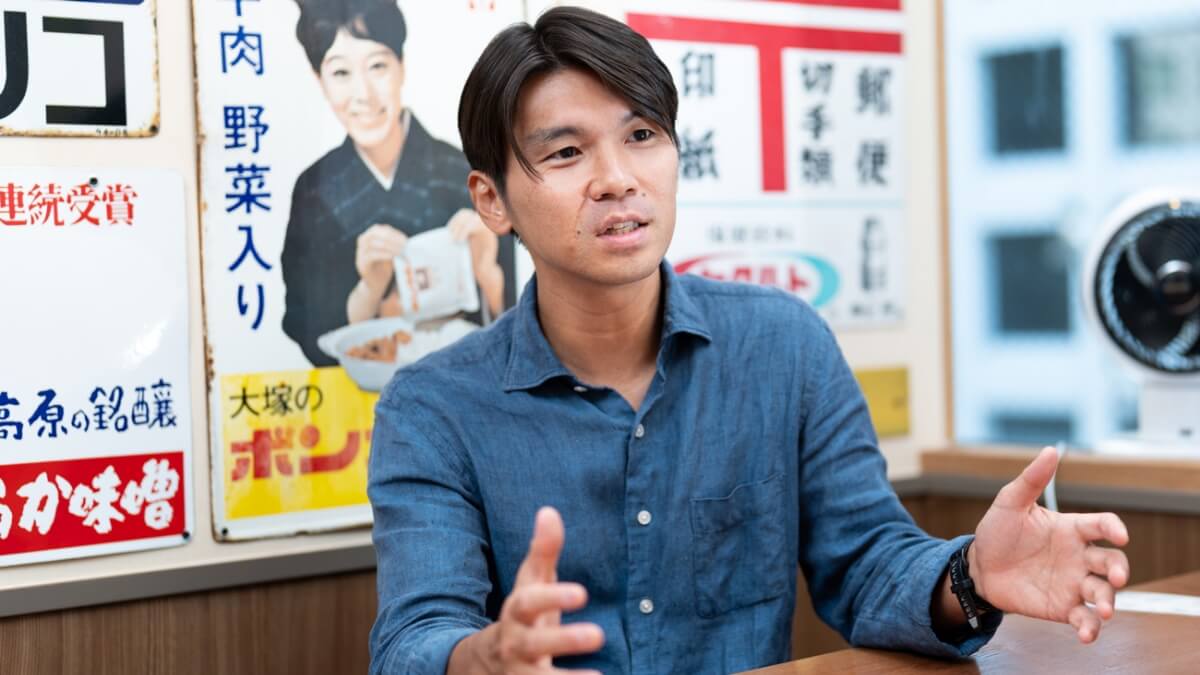
Ryusuke Tsuchiya, Director | Producer, Enjin LTD
Using the Right Media for the Right Target
Michigami: Audience acquisition is just as tricky as planning. How does Enjin approach this?
Akutsu: In addition to email campaigns to the client's in-house list, we use media and digital ads to support recruitment. For example, for financial-sector clients, we propose ads in specialized finance publications or websites. We also recommend industry-specific media based on the client’s target solution or segment. It’s vital to choose media that matches the target audience.
Michigami: What about social media ads?
Akutsu: We do use social and YouTube ads, primarily for awareness. But for driving registrations, we often turn to video ads or offline methods.
Tsuchiya: Our survey found that top awareness channels for large events were “direct mail/letters” (77.8%) and “industry media” (63.0%). Digital ads, word-of-mouth (both 20.4%), and social media (18.5%) were far lower. Still, given how frequently people use these platforms, we see plenty of untapped potential.
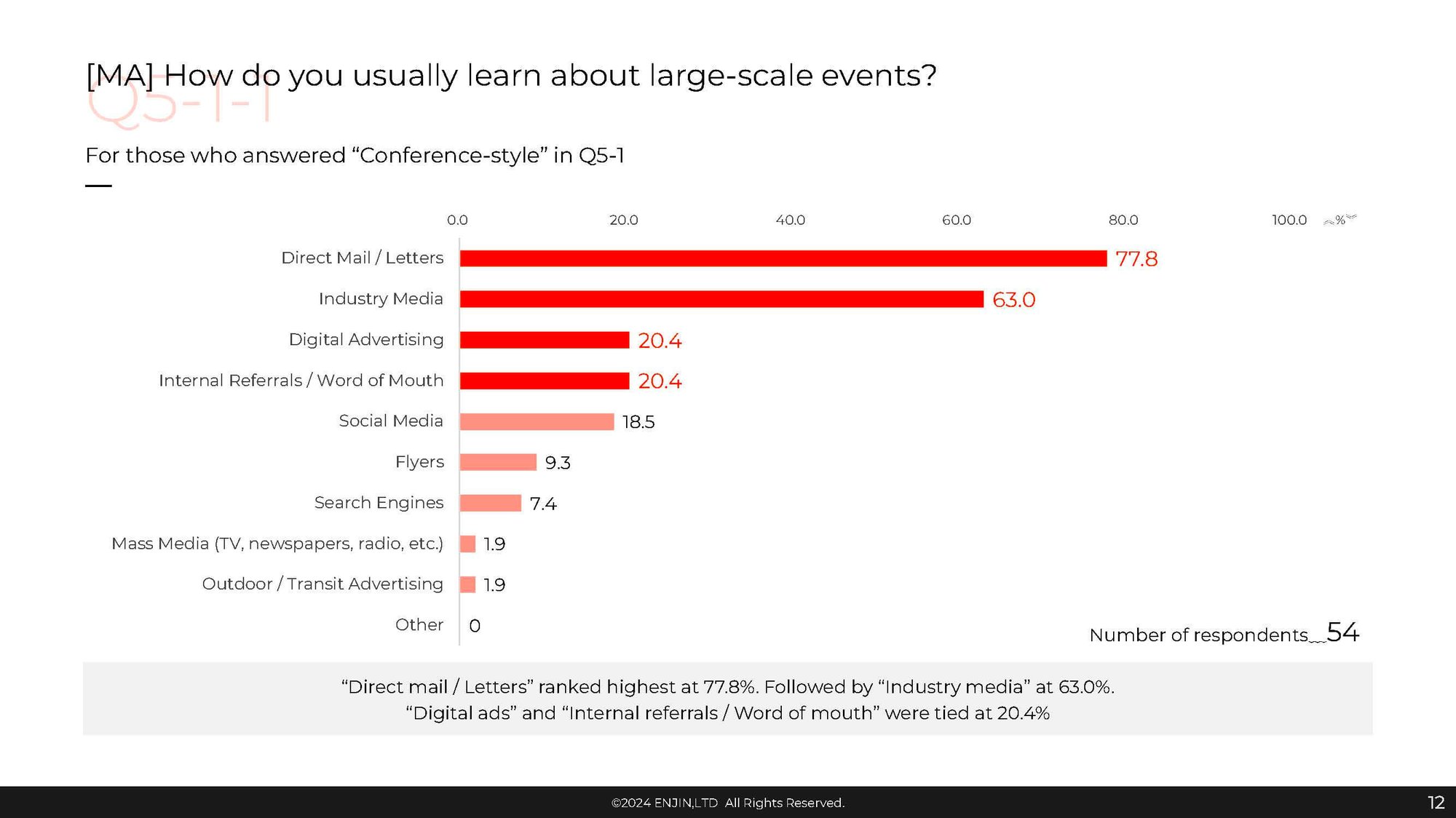
Channels Through Which Large-Scale Events Become Known
(From the Survey on Information Gathering for IT Tool Selection)
Document Download
You can review the survey results introduced in the article,
which were conducted with IT system managers, directly at your convenience.
We hope you find them useful when planning your next event.
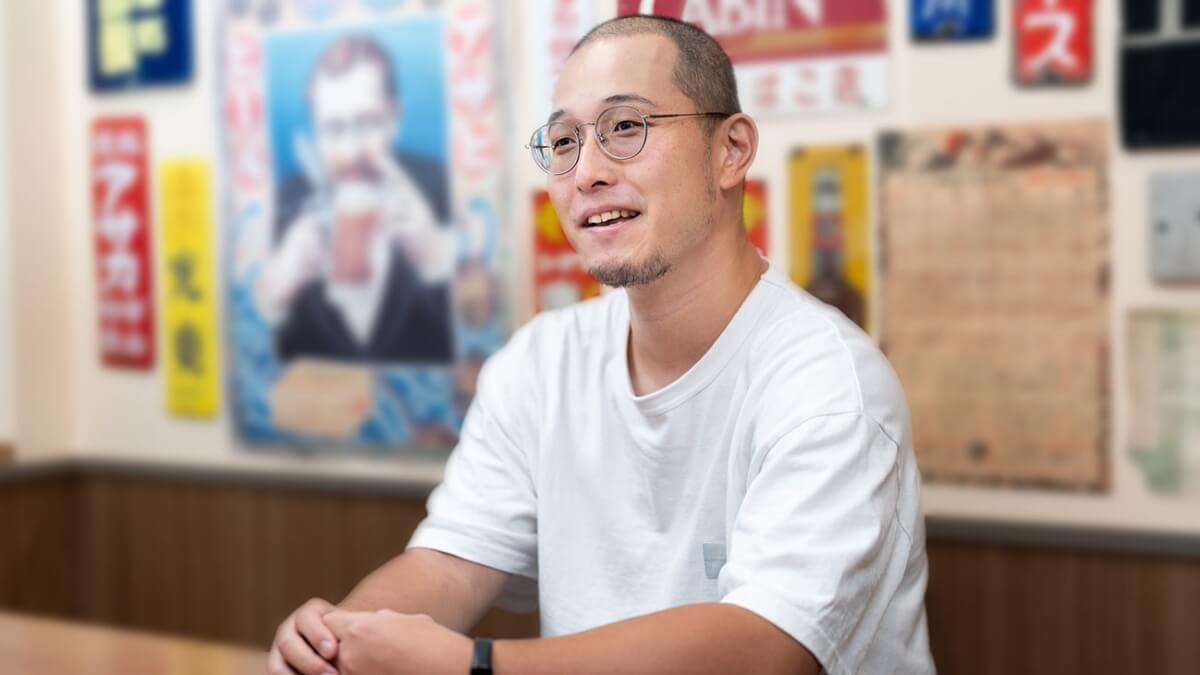
Tsubasa Michigami, Deputy Editor-in-Chief, MarkeZine Editorial Department, Shoeisha Co., Ltd.
Tsuchiya: Now that online events are common, many people expect on-demand viewing if they can’t attend in person. Still, 50.0% of survey respondents cited “being able to ask questions directly to IT tool providers” as a reason for attending, and 44.4% wanted to “physically try the tools.” So live, in-person experiences remain highly valued.
Akutsu: We’ve also seen increasing importance placed on the post-event experience. Offering session downloads or on-demand replays is standard now. But more than that clients are seeking ways to continue the conversation. You need to plan for this from the beginning.
Tsuchiya: Many of our clients want to repurpose event content—for example, turning sessions into articles or videos for owned or external media. Reusing content is efficient, but it still requires thoughtful execution.
Michigami: Yes, post-event communication is essential. Different formats perform differently across channels. For instance, articles are judged by the depth of content, whereas videos may depend on the speaker’s identity. We’re text-focused, but for video media, a different approach makes sense.
Tsuchiya: Absolutely. Event-based leadership is crucial, but repurposing content effectively—especially for reports—takes editorial skill. That’s something we’ll take to heart!
One-Stop Support from Planning to Execution
Michigami: Finally, do you have any advice for event planners?
Akutsu: Events are a major investment. That’s why you need to think holistically—from planning and promotion to day-of execution and follow-up. Enjin provides end-to-end support tailored to each event’s scale and purpose. Don’t hesitate to reach out.
Tsuchiya: Some event companies say, “You decide the purpose and strategy; we’ll just handle the operations.” We’re different. We help clients think through whether an event is even the right approach. We believe success requires solid planning, operational know-how, and the hands-on ability to deal with unexpected issues. That’s our strength.
Michigami: Thank you both for your time today.

